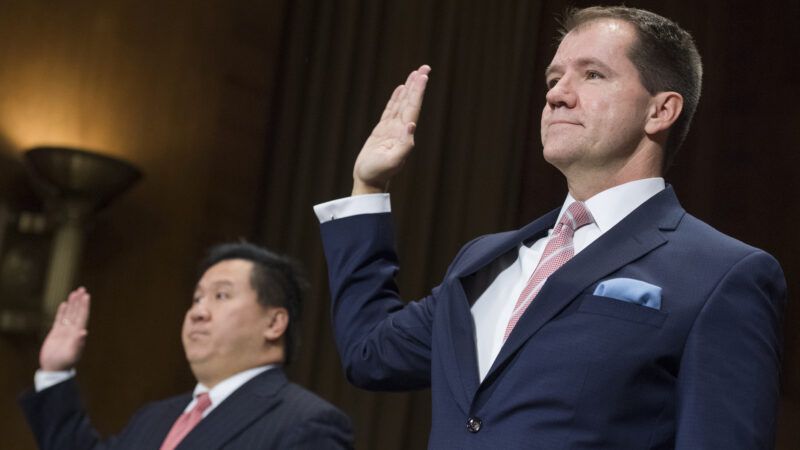Trump Judicial Appointees Clash Over Qualified Immunity and 'the Woke Constitution'
The fight over qualified immunity divides "conservative" judges on the 5th Circuit.

Federal judges Don Willett and James Ho share some surface similarities. They both sit on the U.S. Court of Appeals for the 5th Circuit and were both appointed to that court in 2017 by President Donald Trump. But when it comes to the roiling legal debate over qualified immunity, the two jurists stand miles apart.
Qualified immunity is the controversial legal doctrine that generally shields state actors, including police officers, from being held civilly liable if the conduct that they are being sued over does not violate what the Supreme Court has called "clearly established statutory or constitutional rights."
Willett is one of the doctrine's leading judicial critics. "Qualified immunity smacks of unqualified impunity," he has written. In practice, the doctrine lets "public officials duck consequences for bad behavior—no matter how palpably unreasonable—as long as they were the first to behave badly."
Ho, by contrast, has argued that the cops are not getting enough judicial deference in qualified immunity cases. He has faulted his colleagues on the 5th Circuit for "second-guessing split-second decisions by police officers from the safety of our chambers."
The two jurists clashed openly in Cole v. Hunter (2019), a case involving a family's lawsuit over the police shooting of their mentally disturbed teenage son. Willett conceded that controlling SCOTUS precedent left the lower court with no choice but to give the officers qualified immunity. So Willett blasted away at the precedent. "The real-world functioning of modern immunity practice—essentially 'heads government wins, tails plaintiffs lose'—leaves many victims violated but not vindicated," he wrote.
Ho did not like the sound of that. "Some have criticized the doctrine of qualified immunity as ahistorical and contrary to the Founders' Constitution," Ho wrote, joined by another Trump appointee, Judge Andrew Oldham, citing Willett and other critics of the doctrine. According to Ho and Oldham, Willett's "one-sided approach" is too anti-cop. "Originalism for plaintiffs, but not for police officers," they wrote, "is not principled judging."
Willett and Ho butted heads over qualified immunity again last week. Ramirez v. Guadarrama arose from a horrific incident in which police officers tased a suicidal man who was drenched in gasoline, setting him on fire, killing him, and burning down his house. As Reason's Jacob Sullum observed, "Gabriel Eduardo Olivas doused himself with gasoline, but it was the cops who set him on fire. They were there to help him."
The 5th Circuit ruled in February that the officers who tased Olivas were entitled to qualified immunity. Willett argued in a June dissent that the full 5th Circuit should have reheard the case, which was originally decided by a three-judge panel.
"The panel held that tasing a combustible Olivas did not violate his constitutional protection against excessive force," Willett wrote. "More to the point, [the panel held that] such a claim was not even facially plausible. I have a different view: 'As the facts are alleged…the [Fourth] Amendment violation is obvious.'"
Once again, Ho did not like the sound of that. "Reasonable people can disagree with the doctrine of qualified immunity" and "with what the police officers did here," Ho lectured Willett. But "as judges, we apply our written Constitution, not a woke Constitution." Needless to say, "woke Constitution" was not intended as a compliment.
Willett got the last word. "In my judgment, nothing better captures the yawning rights-remedies gap of the modern immunity regime than giving a pass to alleged conscience-shocking abuse" like the 5th Circuit did here. Perhaps the Supreme Court will take notice of this unfortunate outcome, Willett concluded, and send a message to the lower court that "makes clear that those who enforce our laws are not above them."


Show Comments (36)